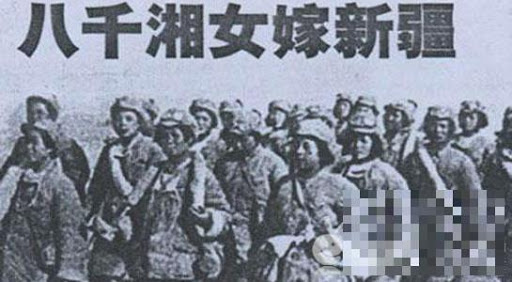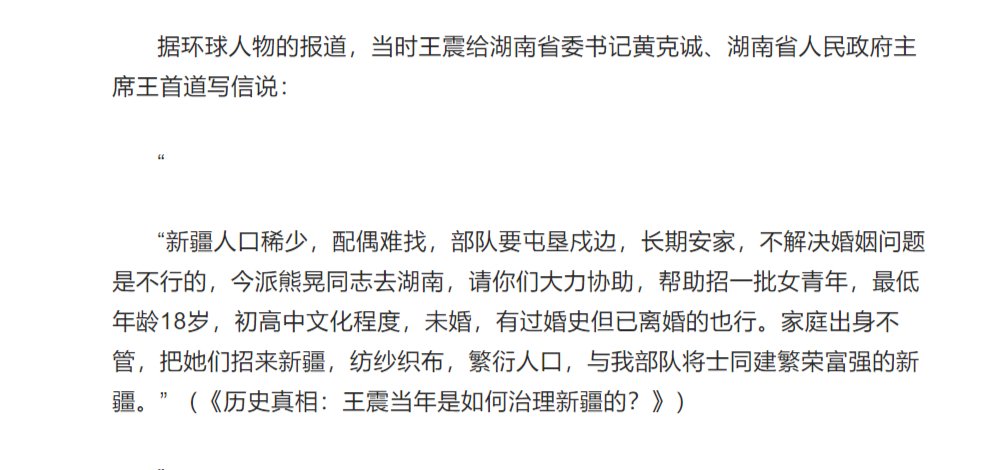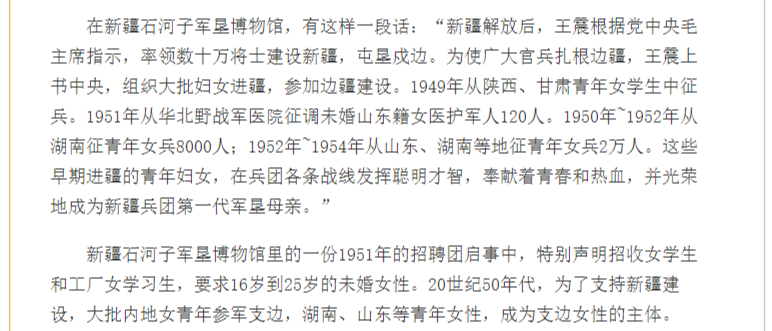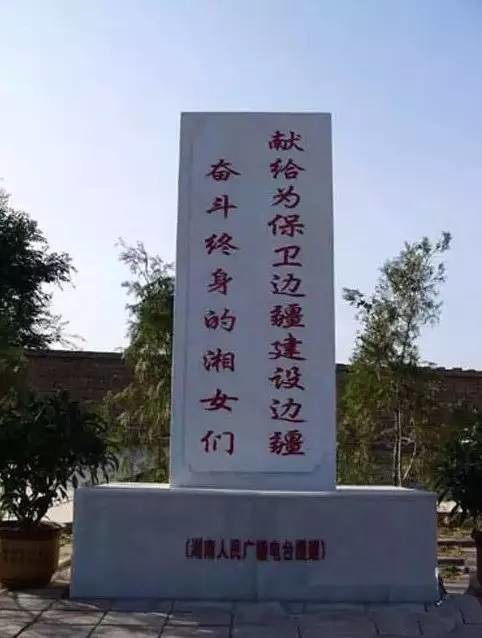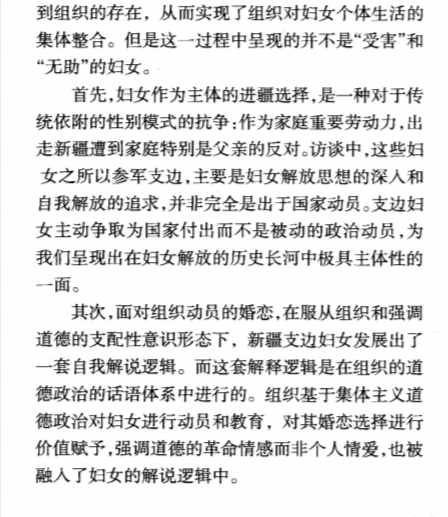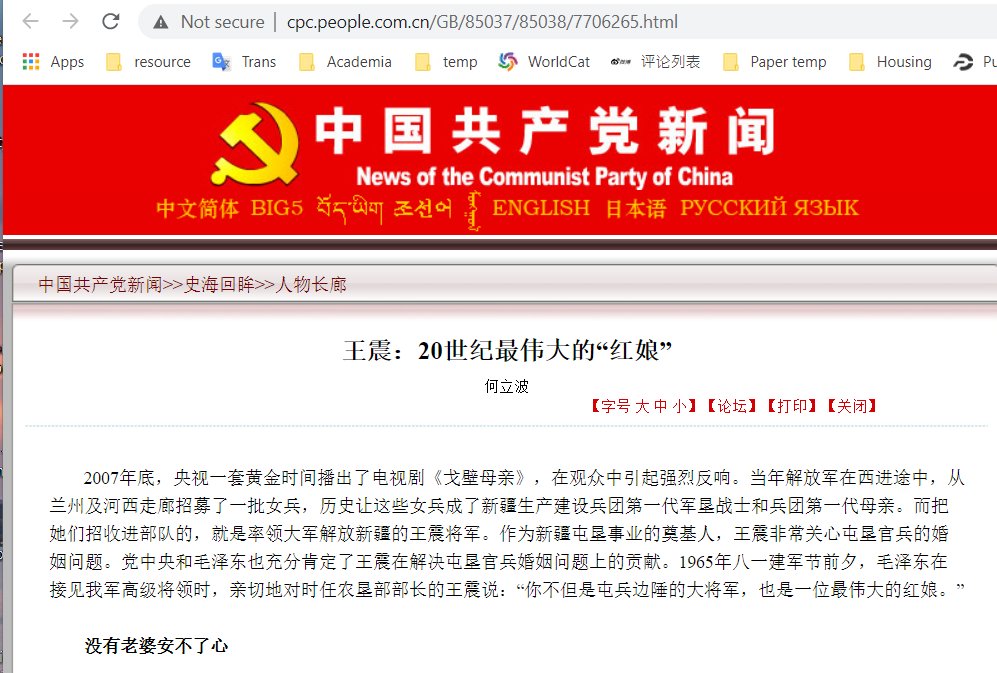the lesser known gender dimension of the (colonial) migration to Xinjiang in the early years of the PRC. a thread.
After the republic was founded, thousands of soldiers were placed in the region for defense & economic production purposes. There was a "problem". There were not
After the republic was founded, thousands of soldiers were placed in the region for defense & economic production purposes. There was a "problem". There were not
enough Han women for them to marry. This became a security & stability problem in the eyes of military leaders.
General Wang Zhen told the central govt that in order for soldiers (Han settlers) to really take root in the region, they need to have wives. With approval he began
General Wang Zhen told the central govt that in order for soldiers (Han settlers) to really take root in the region, they need to have wives. With approval he began
to recruit women from other provinces, first from Hunan.
He wrote to the leader of Hunan prov, asking him to recruit young women for soldiers to marry: "need to have secondary education, unmarried, divorced OK too. Recruit them to XJ... reproduce the population".
He wrote to the leader of Hunan prov, asking him to recruit young women for soldiers to marry: "need to have secondary education, unmarried, divorced OK too. Recruit them to XJ... reproduce the population".
In the actual recruitment advert, however, the "marriage" purpose wasn& #39;t clear
Many young women in the newly founded socialist state chose to go to Xinjiang to overcome traditional gender roles, for the prospect of pursuing study and work, and for patriotism & revolutional ideals
Many young women in the newly founded socialist state chose to go to Xinjiang to overcome traditional gender roles, for the prospect of pursuing study and work, and for patriotism & revolutional ideals
From Wang Ying and Shi Tong& #39;s paper
http://his.cssn.cn/kxk/nxyj/201710/W020171031779798346194.pdf
About">https://his.cssn.cn/kxk/nxyj/... 8000 young women were recruited from Hunan, aka 八千湘女上天山. According to Wang & Shi, those arrived between 1949 and 52 mostly had to accept arranged marriage, even tho some tried to resist and succeeded.
http://his.cssn.cn/kxk/nxyj/201710/W020171031779798346194.pdf
About">https://his.cssn.cn/kxk/nxyj/... 8000 young women were recruited from Hunan, aka 八千湘女上天山. According to Wang & Shi, those arrived between 1949 and 52 mostly had to accept arranged marriage, even tho some tried to resist and succeeded.
After seeing quite some resistance from the first wave of young & educated women from Hunan (official narrative is that due to "wrong working method" 方法简单粗暴), one military officer Liu Xixian 刘锡宪 suggested that they should recruit widowed women from Shandong.
In July 1953, the Central Military Commission issued a 5-year plan for "importing women to Xinjiang" 军委关于输送妇女入疆的五年计划之初步意见, planning to recruit 100k women to XJ from 1953-58, aged 18-30, widowed women can bring children.
Today the official narrative depicts these women as heroines who devoted their lives to defending and developing the frontier region. The opposite one depicts them as passive victims of the authoritarian patriarchal state.
Based on interviews with some of the women,
Based on interviews with some of the women,
Wang and Shi suggest that they were not just passive victims & their choice to go to the frontier was motivated by aspiration for personal emancipation, even tho their own narratives now try to justify collectivist moral politics - they had to rationalize their life, after all.
This interpretation, of course, doesn& #39;t take into account the settler colonialism dimension in this.
It& #39;s disgusting that state media frames Wang Zhen as the "greatest matchmaker of 20c".
He was also known for brutality towards the Uyghurs as head of the military govt 1950-52.
It& #39;s disgusting that state media frames Wang Zhen as the "greatest matchmaker of 20c".
He was also known for brutality towards the Uyghurs as head of the military govt 1950-52.
should add that the Xinjiang Production and Construction Corps (Bingtuan) was founded by Wang Zhen in 1954, comprising 175k out of the 200k military personnel based in XJ, incl the newly recruited women.
The XPCC is administrative, commercial & military at once (军政企合一).
The XPCC is administrative, commercial & military at once (军政企合一).

 Read on Twitter
Read on Twitter